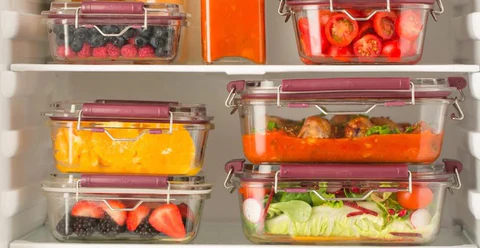When it comes to storing food, freezing is a fantastic way to preserve freshness and extend the shelf life of many ingredients and prepared meals. At TheKitchenApplianceDad.com, we often discuss the best ways to maximize your kitchen’s efficiency and safety, and today we’re tackling a common question: Is it safe to put glass containers in the freezer?
Understanding the properties of glass and the right type of containers to use can help you prevent accidents and food spoilage. Let’s explore the intricacies of using glass containers in the freezer, ensuring your food storage is both safe and effective.
Glass is a popular choice for food storage due to its non-reactive nature, meaning it won’t leach chemicals into food. However, not all glass is created equal, especially when it comes to withstanding extreme temperatures.
Tempered Glass: This type of glass is designed for thermal resistance and strength. It’s treated through a process of extreme heating and rapid cooling, which makes it tougher than regular glass and less likely to break under stress, including temperature changes.
Borosilicate Glass: Known for its impressive thermal shock resistance, borosilicate glass can withstand high and low temperatures much better than regular soda-lime glass (the most common glass type). It’s an ideal candidate for moving between different temperature environments, such as from the oven to the freezer.

Not all glass containers are suitable for freezer use. Here’s what to look for when choosing glassware for freezing:
Check Manufacturer’s Specifications: Always check if the product is labeled as freezer-safe. Manufacturers often specify whether the glass can withstand freezer temperatures.
Opt for Containers with Straight Sides: Containers with straight sides are better suited for freezing. Glass with curved sides can be more prone to breaking as the contents expand.
Lids Matter: Ensure the container has an airtight lid. Lids not only prevent spills but also minimize exposure to air, reducing the risk of freezer burn.
Freezing food in glass is safe as long as you take the right precautions to avoid thermal shock and expansion issues.
While glass is generally safe for freezer use, accidents can happen. It’s important to handle glass containers carefully, especially when they contain frozen food.
If you’re concerned about using glass, there are other materials that are safe for freezing:
Freezing in glass containers can be a safe and effective way to store food, as long as you follow these guidelines. At TheKitchenApplianceDad.com, we’re committed to helping you make the most out of your kitchen appliances and accessories safely and efficiently. By understanding the properties of glass and preparing properly, you can enjoy the benefits of using glass containers in your freezer without worry.

